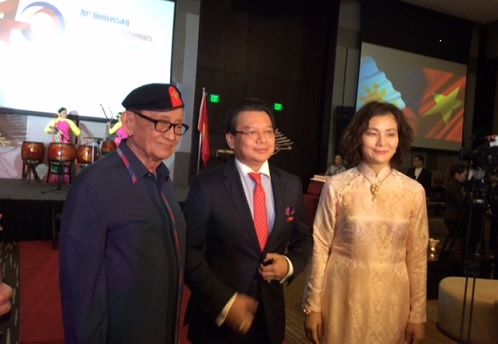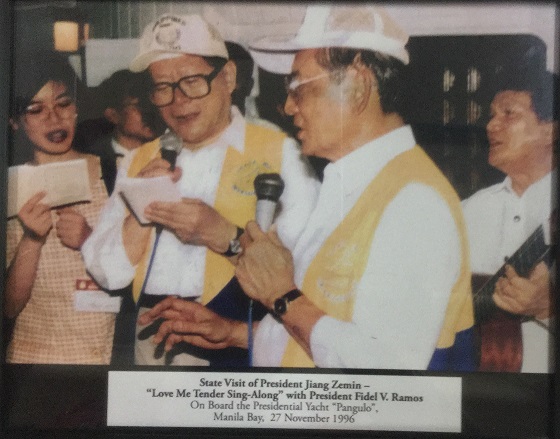
Former President Fidel V. Ramos said there are some things he has to discuss with President Duterte before he agrees to be the latter’s special envoy to China.
Duterte made the announcement during a tribute to him by his fellow Bedans at Club Filipino in Greenhills last Thursday and Ramos said, “It was noisy, there was no time to talk about it.”
Ramos said he is elated by Duterte’s confidence in him for the important job of repairing relations with China especially in the wake of the humiliation that had been rendered by the Permanent Court of Arbitration to the Asian behemoth in the case filed by the Philippines against its nine-dash lines and other activities in the Spratlys. But he said he is 88 years old.
Ramos also said being special envoy does not entail just going to China and talking with the leaders. “You have to plan. Several plans. Plan A, Plan B, etc. You need a staff to be effective.”
He said those are some of the things that he has to discuss with Duterte.
Duterte could not have chosen a better person to speak for him and the country in the negotiations with China, who still controls Scarborough Shoal, 124 nautical miles away from Zambales. China has also built installations in seven reefs in the Spratlys and despite the ruling that the artificial islands have caused massive damage to the corals and the marine environment, the Chinese are not expected to leave the area.
Ramos knows the realities on the ground. He knows the complexities of dealing with China.
It was during the Ramos presidency that the Chinese occupied Mischief Reef, 130.5 nautical miles west of Palawan, almost two years after he made a state visit to China in May 1993 and he and President Jiang Zemin pledged peaceful resolution of conflict between the two countries.
On Feb. 5, 1995, Filipino fishermen discovered installations built by the Chinese in Mischief Reef which must have started in late 1994. Diplomatic and military experts relate it to the Philippine granting of an oil exploration permit to Alcorn Petroleum to collect seismic data in Reed Bank, which is also being claimed by China.
The Ramos government protested China occupation of Mischief reef. What China said were just shelters for fishermen have now become military facilities.
To internationalize the issue, the Ramos government arranged a media visit to Mischief Reef in May 1995. Accompanied by Major General Carlos Tañega, then the chief of the Western Command, a group of 38 local and foreign journalists sailed aboard the vintage BRP Benguet despite protest by China. The Chinese blocked the navy ship but was not able to stop a helicopter with photographers flying over the Reef to take images of their installations.
The Mischief Reef incident spurred the need for a Code of Conduct in the South China Sea. A Declaration for a Code of Conduct was signed in 2002 by ASEAN and China. The Arbitral Tribunal’s decision should hasten the conclusion of the more binding Code of Conduct.
Despite the Mischief Reef incident, communications with China during the Ramos administration was never severed. Relations never worsened to the level during the Benigno Aquino III presidency.

When the Philippines hosted the APEC Leaders summit in 1996, Jiang came and even extended his stay into a state visit. (Xi Jinping also came to Manila in last year’s APEC Leaders meeting but the strain of the relationship was obvious). Jiang and Ramos even had a good time singing western ballads during the state dinner.
As former president and a military officer, Ramos knows the virtues of patience especially if one lacks military muscle. He said his guideline is caution, sobriety and tolerance.
There are some concerns that China’s defeat in the legal arena might make it do something drastic like tighter control of Scarborough shoal and boarding of BRP Sierra Madre in Ayungin shoal.
That’s where the role of a special envoy is important.
In the forum at the University of the Philippines last Friday, former Solicitor General Estelito Mendoza related a meeting with the late Deng Xiao Ping and Ferdinand Marcos in Beijing. With Mendoza was Foreign Secretary Carlos P. Romulo, who was formerly United Nations Secretary General.
Mendoza said Deng and Marcos agreed that they should talk about the Spratlys but they should not bring in the United States, Japan and the United Nations. Just the Philippines and China.
Marcos said that the agreement should have an arbitration clause in case the talks reach a stalemate. But Deng nixed a third party intervention. Marcos asked, “What happens then if we don’t agree on certain issues?” Deng answered, “Talk some more.”
Marcos said but what if we still don’t agree. Deng replied, “Talk some more.”
FVR knows that tactic. We asked him once why he continued to talk with the Left when the negotiations seemed to be going nowhere. He replied: “Tok, tok is better than bang, bang, bang.”
An unsolicited advice to FVR should he take the challenge:
the PCA decision should serve as the basis for improved bilateral negotiations in the future. It has significantly narrowed the scope of what is in reasonable and justifiable dispute and therefore should help the parties move closer to a final resolution of their differences with more confidence.
The Tribunal’s decision is much more than a pyrrhic victory for the Philippines as some will suggest. This opinion will have normative power that over the long run will and should affect the way every state thinks about the South China Sea in the future. Ultimately, the ruling’s power is not in its direct enforceability, but in the way it will inevitably alter perceptions about right and wrong actions in the South China Sea. Coercion will no longer stand with moral impunity.
China’s failure of epic proportions in its strategy of advancing primarily the role of power versus the rule of law has Xi Jin Ping and the Communist Party in an awkward position, hoping to fan nationalist sentiments without pushing its citizens to mass actions which is a very dangerous situation that might turn ugly and instead vent the population’s ire against Xi and the party leaders themselves who are preparing for the 2017 convention.
Between now and the convention, Xi and his gov’t should survive all forms of censure, distrust, criticisms, and loss of confidence not just by the party in particular but the whole country (or the world!) in general.
They cannot commit another blunder to coverup this monumental fuck-up.
tok, tok, fvr is big on tok, tok, because he cant find solution? panay tok, tok, in the meantime china is builing more and more structures, palapit ng palapit, still insisting on legality of 9 dash line. habang si fvr is still on tok tok. next time, fvr stops tok, tok and looks around, the chinese are probably occupying malakanyang, and all fvr can do is more tok, tok still.
at school, I’ve read of 3 different chinese philosophers, one said, he’ll wait for the cuckoo bird to sing, the other will try to convince the cuckoo to sing, while the 3rd said he’ll kill the cuckoo bird if it wont sing. different people, different temperament.
fvr cannot seem to know when to stop tok, tok. I bet, he’s afraid of bang bang noise. the chinese in the meantime, like bang bang noise. the more the merrier. bang bang noise to drive away evil spirits.
anyhow, kung tok tok lang naman ang foreign policy na pinagmamalaki ni cuckoo fvr, and maybe, some singsing along policy included, he need not go to china. for he can do all his tok tok and singsing sa chinese embassy sa manila, much cheaper yan. and wont cost much to the taxpayers.
Our government must never forgetr: We are the aggrieved party in this case.
on 5. short but very good advice.